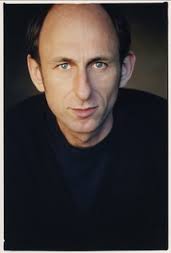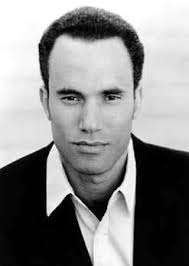David Cale
Perhaps best described as a performance monologist, David Cale creates work where “the lives of the characters who inhabit his stories may be wildly disparate, but all seem suspended somewhere between memory and desire, in a waking dream” (Holden, 2000, 198). In his piece Deep in a Dream of You, Cale created 12 characters vivified through accompanying monologues, which function through his use of dramatic poetry. The language Cale employs is striking, and heightened through his stage technique. For instance, his monologue titled Swimming in the Dark is whispered into the mic, while the stage is in blackout, magnifying his words. Stephen Holden suggests this “beckon[s] us to a blissful, vaguely sinister repose in an enveloping tropical paradise” (ibid).
Cale’s alignment of stage images and poetry, causes both aspects of his performances to be intensified, and is something which I hope to achieve. I do not wish to simply recite monologues, there must be a reason why I am doing live on stage, and not simply recording myself speaking them. Therefore, the lighting and set must heighten my poetry, either by invigorating or undermining it. Additionally, the vocal qualities Cale chooses to employ with each monologue should not be overlooked. He transitions between male and female characters, and alters his voice accordingly. I do not need to embody characters when performing my poems, but I must decide on a method of speaking which furthers the words I am saying. I believe I need an intensity and commitment to the words which strengthen the meanings of them. However, there must be variety in my delivery, so as not to create a monotonous monologue – something which I fear. I am currently experimenting with ways to deliver the performance, and hope to find a suitable, interesting method.
Swimming in the Dark
I want to take you swimming in the dark
Its something you’ve never done
Its something you’d like to do
I know a lake
where the fish are warm
And the water barely moves
There’s no weed to get tangled in
And in this place, Money isn’t an object
No one can touch you here
No policeman will strike you with his billy club
Smash you in the features
No religion can harm you
No nun can get on the television
And make threatening remarks
And the newspapers wont depress you
There’s no television to reduce you
Nothing will carry weight
When people are just another disappointment
I will take you to this place
Drive you to the water
Remove your clothes with a tenderness reserved for lovers
Under a clear sky and stars
Well go swimming in the dark
Its something you’ve never done
Its something you’d like to do
I know a lake
where the fish are warm
And the water barely moves
Lets go swimming in the dark.
Roger Guenver Smith
Roger Guenver Smith is an actor and performance monologist, who creates long and compelling monologues – more akin to poetry – often centred on his experience as a racial minority who is “too light to [be] black … and too dark to [be] white” (Jefferson, 2000, 332). Although the themes of his poetry are quite separate from my own, his style and delivery is something I respect (and in truth, am quite envious of). He creates poetry where “the most grotesque facts and the most clear-sighted hallucinations join forces” and “every horror has its bitter comic dose” (ibid, 333). He comments on contemporary life, criticising the result of years of inequality. His poem Blood and Brains suggests something that many feel: a widespread form of slavery remains, as people are manipulated by the consumer economy, which uses poverty as a means of suppression and punishment.
Excerpt from Blood and Brains:
I am a fugitive slave
I live underneath the Hollywood Freeway
Or the Brooklyn Bridge
Somewhere
Under the Rainbow
My coalition kept warm
by blazing barrels of trashscraps from the cane fields
and the fast food establishments
I’m on the run
Up and down a basketball court
and into the bush
You can’t touch me
I am a maroon
Chilling high above
the smog line
and the tourist enclaves
The North Star
visible every night
My guide into a Philly groove
The Delfonics
Soundtracks to my most intimate moments
Ain’t no stopping me now
Mike Albo
Mike Albo is a performance poet, with the emphasis on performance. His experimental poetry is delivered as numerous personalities that he morphs between throughout his show, producing a performance that can be isolating for the audience, and difficult to understand. However, that effect does not seem to last long:
Albo is uneasy listening. His performance style first distances the audience with a wall of words, then absorbs them. Albo … concatenate[s] almost recognisable things – linguistic theory and brand marketing, sophisticated comic books, dystopic fiction, alternative comedy, confessional theatre and John Ruskin. The effect is mildly hypnotic.
(Quart, A. 2000, 371)
Albo’s style differs from my own performance, as he morphs between multiple personalities – something which I do not do. However, labelling Albo’s voices as characters would be inaccurate, as they are closer to being aspects of his personality and experiences, making his shows “both extremely personal and polyvocal” (ibid, 372).
A recurring theme in Albo’s shows is the arrival of nothingness. He goes from a a manic art director to suddenly declaring that his job is nothing. It is abyssal. Empty. This eruption then informs the next section of his show, where his language aligns with the emptiness, becoming simpler. The tailoring of his poetic style and delivery to match the transforming subjects of his show is an element of my performance which must be developed. Studying a range of performance artists, poets, and monologists has shown me the importance of delivery: there must be a story unfolding, and my voice must match or emphasise it.
Albo’s style is most closely informed by Language Poetry. Alissa Quart explains Albo’s use of Language poetry, saying its “disjunctive phrases, often enumerations of brand names and technological argot, act as critiques of advertorial language and faulty language and faulty social structures” (2000, 372). Language Poetry as a concept also emphasises the importance of the listener/reader as giving meaning to the words. These aspects of the form interest me, as I’ve often considered the fallibility of language as a means of expression, and Albo’s use of it alongside bears similarity to my poems, which merge classic myths alongside brands such as Doritos.
Quart best describes Albo’s shows, saying they:
satirize ad-addled contemporary life, a world where experience has become so mediated that it may not even exist anymore. But Albo … also love[s] [his] junk culture. When [he] recites: “Netscape Yahoo Netanyahu Net HOT Anyahu! Hotbot Not-ham cashmae tastations anorexic orthorexic tanorexic bigorexic literati gliterati digerati castrati noterati notdogs mocktails are really hot right now,” he’s really into America’s lingo and its hucksterism. [He has] got a sweet tooth for our magazine-metaphor self-descriptions, the TV-promo vernacular of our overheard conversation. But [he wants] us to remember that these things are not just amusing, they are also very strange.
(2000, 372)
It is apparent that the themes of Albo’s performance and his comedic style are not too similar to my own, but I do see parallels in the way we write, where his “favorite linguistic units are the sentence and the word, rather than the monologue as a whole” (ibid). Therefore, although I wish to create a different atmosphere within my performance, I have found elements of Albo’s delivery and methodology to be valuable to study, and hope to connect to the audience as he does. He does not interact with the audience, which can be a very beneficial aspect to a solo performance. I currently do not have any moments where I interact with the audience, so will either have to add some, or find a way to draw them into the show without direct contact. Albo has been an interesting performer to watch, as he manages to compel audiences into listening to long monologues through his method of writing and delivery.
(Albo performing in 2004, titled Reeee!)
Works Cited:
Holden, S. (2000) David Cale. In: Bonney, J. (ed.) Extreme Exposure: An Anthology of Solo Performance Texts from the Twentieth Century. New York, USA: Theatre Communications Group, 197-208.
Jefferson, M. (2000) Roger Guenver Smith. In: Bonney, J. (ed.) Extreme Exposure: An Anthology of Solo Performance Texts from the Twentieth Century. New York, USA: Theatre Communications Group, 332-343.
Quart, A. (2000) Mike Albo and Virginia Heffernan. In: Bonney, J. (ed.) Extreme Exposure: An Anthology of Solo Performance Texts from the Twentieth Century. New York, USA: Theatre Communications Group, 371-379.


